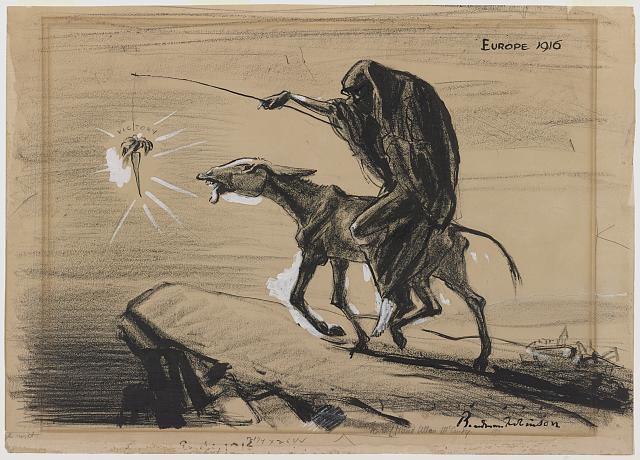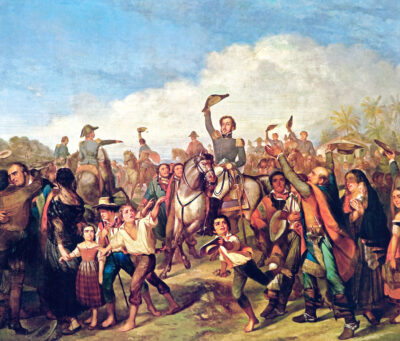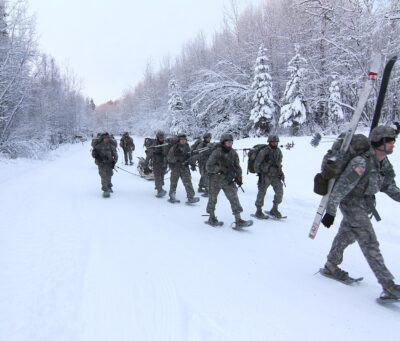It has become fashionable to call for diplomacy separate from military action. During the 2020 Democratic primaries a number of candidates overwhelmingly endorsed “diplomacy” as an alternative to force. Candidate Donald Trump, too, called for restraint in use of force and expressed a preference for “negotiation,” bragging about his deal making skills and claiming that he can get along with everybody. Such political messaging is nothing new. Then-Senator Barack Obama said the same thing when he ran for President, and people were more receptive to it than usual due to the unpopularity of the 9/11 wars.
Americans, as a consequence, increasingly seem to prefer diplomacy over the use of military force. An alarmingly growing number of elected officials are calling for a decrease in the military budget in favor of – what else? – diplomacy. But it is worth making clear that diplomacy is not an alternative strategy to the threat of force, but rather a tool that relies upon and is enabled by it. The problem, as Henry Kissinger has aptly observed, is that for Americans diplomacy too often begins where war ends, and vice versa.
So what do these people mean by diplomacy? It is the art of explaining to another party why taking an action that benefits oneself is in the other party’s interest. The problem is that, too often, that’s not the case. For instance, developing nuclear weapons is in the interests of the regimes in Iran and North Korea, while the United States’s interests require those regimes not to develop nuclear weapons. So, how do you reconcile irreconcilable differences?
“With diplomacy!” proponents of diplomacy like to say. “We just need to talk and get along.” Wishful thinking.
Diplomacy in Practice
Here is what diplomacy looks like in practice: superpowers have the benefit of having superpowers. They have the luxury of manipulating the pieces on the table and rearranging them. If geopolitics is chess, diplomacy is the art of saying “checkmate.” It does require compromise on one’s own side, surely, but masterful diplomacy is one that gets the most concessions from the other party while conceding the least oneself. Power – hard and soft alike – allows states to change the calculation on the other side.
Democrats love the JCPOA (Joint Comprehensive Plan of Action, or the Iran nuclear deal). But the JCPOA was only possible because the United States led the world in putting immense economic pressure on Iran, always underwritten by the threat of military force. Indeed, President Obama always emphasized that “all options [were] on the table,” a not-so-subtle reference to military action. During the UN General Assembly address, Israeli Prime Minister Benjamin Netanyahu placed a redline on Iran’s program, for which he was mocked. The Israeli government later clarified the redline to be 240 kilograms of enriched uranium. By the admission of the Obama administration officials, throughout the negotiations, Iran came very close to that redline, but it never enriched more than 240 kilograms of uranium.
Examples of this kind of behavior abound, and they go as far back as Thucydides’s History of the Peloponnesian War, the foundational text of strategic studies. Thucydides writes that Brasidas, the clever Spartan officer, arrived at the city of Acanthus to ask them to revolt against the Athenians and ally with the Spartans. He told his hosts that he had come in peace and not to wage war. Before mentioning peace, however, he remarked:
Acanthians, the Spartans have sent me out with an army to make good the reason that we gave for the war when we began it, namely, that we were going to war with the Athenians in order to free Hellas. [1]
If he had come in peace and just to conduct diplomacy, he did not need to have come with an army, indeed one much larger than the one Acanthus had, and he certainly did not have to begin his speech by mentioning it. Brasidas used his army to at once issue a subtle threat and give the promise of using his army to defend his audience. One might say that it was the first recorded instance of dual-track diplomacy. His trick worked, and Acanthians revolted against the Athenians to join the Spartans.
In more recent history, diplomacy in Versailles was possible only because the Germans had surrendered after a bloody war. The Treaty of Paris came into being because the British realized that they could not take back their American colonies. During the Cold War, despite several attempts by the two communist powers, West Berlin remained a free city and China twice backed off invading Taiwan, all because the United States threatened the use of nuclear weapons during both the Berlin and Taiwan Strait Crises.
In 1972, the Soviets sent three submarines to attack American aircraft carriers near the coast of North Vietnam. American attack submarines were dispatched to the region and Henry Kissinger to Moscow, where he showed a map to the Soviet leader, Leonid Brezhnev. The map displayed the three Soviet submarines, surrounded by 28 American ones. The message was clear: If you make a move, we will sink your submarines.The Soviets backed off. The best example of the current century involved negotiations with Libya. On December 13, 2003, American forces extracted Saddam Hussein from a cave because the Iraqi dictator had expelled inspectors tasked with investigating his nuclear program. On December 19, 2003, the Libyan dictator, Muammar Ghaddafi, announced that he was dismantling his nuclear program.
This works both ways. In the 1970s, the Vietnamese use of guerrilla warfare coerced their American enemy into diplomatic negotiations. Most recently, the Taliban’s successful resistance against the NATO-led forces has made Americans seek a negotiated end to the Afghanistan War.
Throughout all of these instances, diplomacy has occurred as a result of the use or the threat of the use of military force. In some instances, military success has given the United States the upper hand. In Afghanistan and Vietnam, the stalemates created a situation more favorable to America’s opponents.
Errors in Mirroring
Some 2020 Democratic candidates, like Senator Bernie Sanders and Tom Steyer, reminded us that there are mutual concerns for the world that brings all of us together and make diplomacy possible, especially climate change. Yes and no. Climate change is a challenge to humanity. This is indisputable. Yet, not every world leader has the long-term interest of humanity at heart. A big mistake in conducting diplomacy is to understand the other party as one understands oneself, not as the other parties understand themselves. There is a possibility that Vladimir Putin does care about preventing the end of human civilization, but it is also plausible that he either does not believe that climate change poses such a threat or, alternatively, that he does not care about preventing it. After all, Democrats have failed to successfully conduct diplomacy with Republicans in regards with climate change, and there is enough evidence to believe that Putin and Xi Jinping will be at least as difficult as Congressional Republicans. An easier explanation for why China and Russia joined the Paris Agreement is that the United States made more concessions.
Another classic mirror-imaging error is the assumption that other leaders have the best interests of their peoples at heart, or even that they rationalize ‘interest’ the same way as we do. An American president or a European prime minister is very well aware that negative economic growth rates have catastrophic political outcomes, besides the point that they usually run for office to do good for their own peoples. Dictators do not have to face reelection, however, so they can absorb more economic pressure than a democratic leader. (One of the very few instances that economic sanctions had a decisive coercive impact was during the Suez Crisis, when the United States imposed them against the United Kingdom, a democracy.) Or, we understand interest through the lens of security and prosperity. The Islamic State understood interest through the lens of forcing people into heaven.
Diplomacy is not just sitting in a room and talking. More than anything, it’s setting the table favorably for oneself before initiating talks to begin with.
So the saying goes: “reasonable people can disagree.” Now try persuading unreasonable dictators to agree with you – dictators with Napoleonic complexes who have spent their lives being affirmed, reaffirmed, and seldom challenged by their subordinates. Even in conducting diplomacy with allies, there is the unspoken (and occasionally spoken) reality that they are benefiting from America’s security umbrella, so they need to accommodate our interest.
When the United States was attacked on September 11, 2001, it was to a great degree NATO members’ commitment to our security umbrella that convinced them to join the coalition against the Taliban. What got the deal done, however, was the British telling them that if they ever wanted the United States to come to their defense, they better get onboard. Again, America’s large military sealed the deal, this time through the threat that it would not be used to defend the audience.
Flipping the Script: Carrots and Sticks
The U.S. military remains the U.S. government’s strongest asset in foreign policy. American allies depend on the U.S. military for security; adversaries are threatened by it more than anything else. A strong U.S. military, complemented by a credible threat to use it, makes the job of American diplomats easier against adversaries by making defying the United States costlier than conceding to its wishes. Points of friction between two states can resolve through either concession on one’s interests or coercion through force or at least threatening it. The larger that force is, the fewer concessions American diplomats will have to make on behalf of American citizens.
Shay Khatiri is a member of the AHS Chapter at The Paul H. Nitze School of Advanced International Studies (SAIS), Johns Hopkins University, where he is a MA candidate and Ambassador Andreas Baum Fellow in the Strategic Studies Department.
—
Notes:
[1] Thucydides, History of the Peloponnesian War, ed. Robert Strassler (Glencoe: Free Press, 1998), 48-51.
Image: “‘Europe 1916 by Boardman Robinson” by Opencooper, retrieved from https://www.loc.gov/pictures/item/2010643837/, image is in the public domain.



